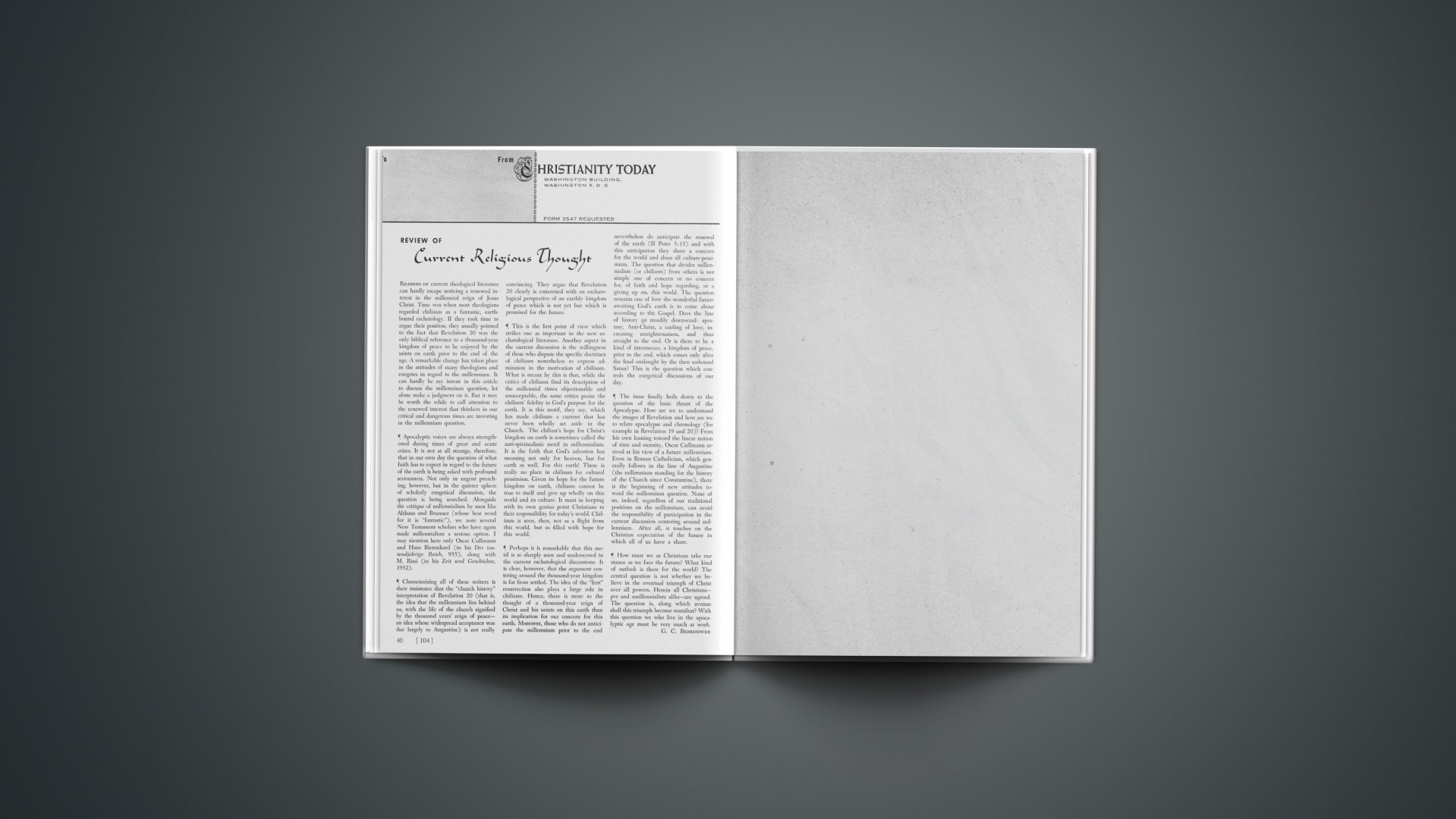Readers of current theological literature can hardly escape noticing a renewed interest in the millennial reign of Jesus Christ. Time was when most theologians regarded chiliasm as a fantastic, earth-bound eschatology. If they took time to argue their position, they usually pointed to the fact that Revelation 20 was the only biblical reference to a thousand-year kingdom of peace to he enjoyed by the saints on earth prior to the end of the age. A remarkable change has taken place in the attitudes of many theologians and exegetes in regard to the millennium. It can hardly be my intent in this article to discuss the millennium question, let alone make a judgment on it. But it may be worth the while to call attention to the renewed interest that thinkers in our critical and dangerous times arc investing in the millennium question.
Apocalyptic voices are always strengthened during times of great and acute crises. It is not at all strange, therefore, that in our own day the question of what faith has to expect in regard to the future of the earth is being asked with profound seriousness. Not only in urgent preaching, however, but in the quieter sphere of scholarly exegetical discussion, the question is being searched. Alongside the critique of millennialism by men like Althaus and Brunner (whose best word for it is “fantastic”), we note several New Testament scholars who have again made millennialism a serious option. I may mention here only Oscar Cullmann and Hans Bietenhard (in his Das tausendjahrige Reich, 955), along with M. Rissi (in his Zeit und Geschichte, 1952).
Characterizing all of these writers is their insistence that the “church history” interpretation of Revelation 20 (that is, the idea that the millennium lies behind us, with the life of the church signified by the thousand years’ reign of peace—an idea whose widespread acceptance was due largely to Augustine) is not really convincing. They argue that Revelation 20 clearly is concerned with an eschatological perspective of an earthly kingdom of peace which is not yet but which is promised for the future.
This is the first point of view which strikes one as important in the new eschatological literature. Another aspect in the current discussion is the willingness of those who dispute the specific doctrines of chiliasm nonetheless to express admiration in the motivation of chiliasm. What is meant by this is that, while the critics of chiliasm find its description of the millennial times objectionable and unacceptable, the same critics praise the chiliasts’ fidelity to God’s purpose for the earth. It is this motif, they say, which has made chiliasm a current that has never been wholly set aside in the Church. The chiliast’s hope for Christ’s kingdom on earth is sometimes called the anti-spiritualistic motif in millennialism. It is the faith that God’s salvation has meaning not only for heaven, but for earth as well. For this earth! There is really no place in chiliasm for cultural pessimism. Given its hope for the future kingdom on earth, chiliasm cannot be true to itself and give up wholly on this world and its culture. It must in keeping with its own genius point Christians to their responsibility for today’s world. Chiliasm is seen, then, not as a flight from this world, but as filled with hope for this world.
Perhaps it is remarkable that this motif is so sharply seen and underscored in the current eschatological discussions. It is clear, however, that the argument centering around the thousand-year kingdom is far from settled. The idea of the “first” resurrection also plays a large role in chiliasm. Hence, there is more to the thought of a thousand-year reign of Christ and his saints on this earth than its implication for our concern for this earth. Moreover, those who do not anticipate the millennium prior to the end nevertheless do anticipate the renewal of the earth (2 Peter 3:13) and with this anticipation they share a concern for the world and shun all culture-pessimism. The question that divides millennialists (or chiliasts) from others is not simply one of concern or no concern for, of faith and hope regarding, or a giving up on, this world. The question remains one of how the wonderful future awaiting God’s earth is to come about according to the Gospel. Does the line of history go steadily downward: apostasy, Anti-Christ, a cooling of love, increasing unrighteousness, and thus straight to the end. Or is there to be a kind of intermezzo, a kingdom of peace, prior to the end, which comes only after the final onslaught by the then unbound Satan? This is the question which controls the exegetical discussions of our day.
The issue finally boils down to the question of the basic thrust of the Apocalypse. How are we to understand the images of Revelation and how are we to relate apocalypse and chronology (for example in Revelation 19 and 20)? From his own leaning toward the linear notion of time and eternity, Oscar Cullmann arrived at his view of a future millennium. Even in Roman Catholicism, which generally follows in the line of Augustine (the millennium standing for the history of the Church since Constantine), there is the beginning of new attitudes toward the millennium question. None of us, indeed, regardless of our traditional positions on the millennium, can avoid the responsibility of participation in the current discussion centering around millennium. After all, it touches on the Christian expectation of the future in which all of us have a share.
How must we as Christians take our stance as we face the future? What kind of outlook is there for the world? The central question is not whether we believe in the eventual triumph of Christ over all powers. Herein all Christians—pre and amillennialists alike—are agreed. The question is, along which avenue shall this triumph become manifest? With this question we who live in the apocalyptic age must be very much at work.










